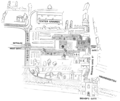The Psychiatry Portal Psychiatry is the medical specialty devoted to the diagnosis, prevention, and treatment of deleterious mental conditions. These include various matters related to mood, behaviour, cognition, perceptions, and emotions. Initial psychiatric assessment of a person begins with creating a case history and conducting a mental status examination. Physical examinations, psychological tests, and laboratory tests may be conducted. On occasion, neuroimaging or other neurophysiological studies are performed. Mental disorders are diagnosed in accordance with diagnostic manuals such as the International Classification of Diseases (ICD), edited by the World Health Organization (WHO), and the Diagnostic and Statistical Manual of Mental Disorders (DSM), published by the American Psychiatric Association (APA). The fifth edition of the DSM (DSM-5), published in May 2013, reorganized the categories of disorders and added newer information and insights consistent with current research. Treatment may include psychotropics (psychiatric medicines) and psychotherapy, and also other modalities such as assertive community treatment, community reinforcement, substance-abuse treatment, and supported employment. Treatment may be delivered on an inpatient or outpatient basis, depending on the severity of functional impairment or risk to the individual or community. Research within psychiatry is conducted on an interdisciplinary basis with other professionals, such as epidemiologists, nurses, social workers, occupational therapists, and clinical psychologists. (Full article...) Selected article Anti-psychiatry originates in an objection to what some view as dangerous treatments. Examples include electroconvulsive therapy, insulin shock therapy, brain lobotomy, and the over-prescription of potentially dangerous pharmaceutical drugs. An immediate concern lies in the significant increase in prescribing psychiatric drugs for children. There were also concerns about mental health institutions. Every society, including liberal Western society, permits involuntary treatment or involuntary commitment of mental patients. (Full article...) Selected image Windows of a person showing symptoms of paranoia and persecutory delusions, symptoms of schizophrenia image credit: Schizophrenic window
WikiProjectsSelected biographyAlfred W. Adler (February 7, 1870 – May 28, 1937) was an Austrian medical doctor, psychotherapist, and founder of the school of individual psychology. His emphasis on the importance of feelings of inferiority—the inferiority complex—is recognized as isolating an element which plays a key role in personality development. Alfred Adler considered human beings as an individual whole, therefore he called his psychology "Individual Psychology" (Orgler 1976). Adler was the first to emphasize the importance of the social element in the re-adjustment process of the individual and who carried psychiatry into the community. In collaboration with Sigmund Freud and a small group of Freud's colleagues, Adler was among the co-founders of the psychoanalytic movement and a core member of the Vienna Psychoanalytic Society: indeed, to Freud he was "the only personality there". He was the first major figure to break away from psychoanalysis to form an independent school of psychotherapy and personality theory, which he called individual psychology because he believed a human to be an indivisible whole, an individuum. He also imagined a person to be connected or associated with the surrounding world. (Full article...) General imagesThe following are images from various psychiatry-related articles on Wikipedia.
Related portalsTopicsSubcategoriesAssociated WikimediaThe following Wikimedia Foundation sister projects provide more on this subject:
Discover Wikipedia using portals |































